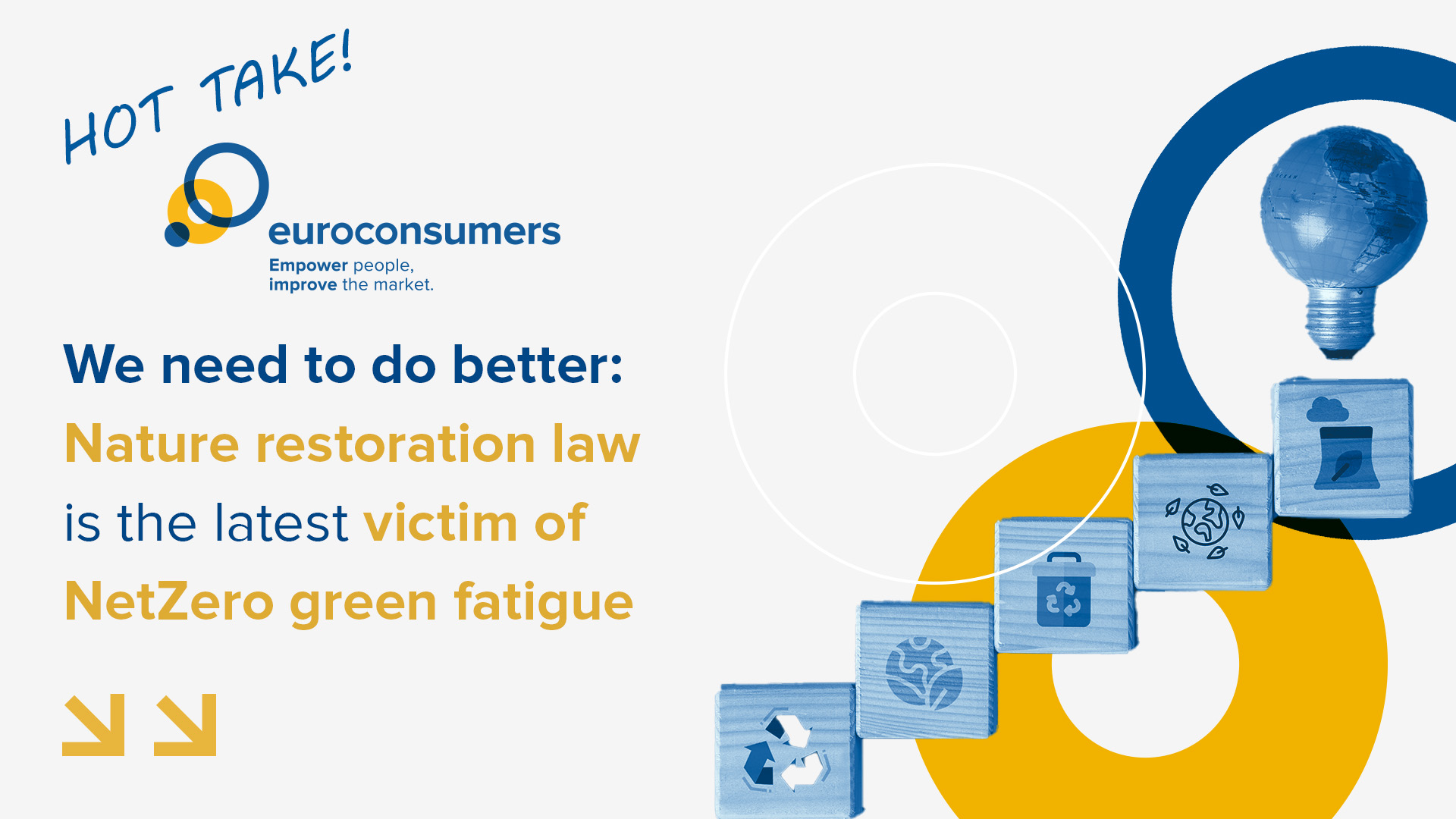
BeXt event recap - is the future of the Green Deal safe?
Last week, Euroconsumers BeXt panelists were asked the big question for the European Parliament and Belgian 2024 elections: To be green or not to be green?



A vote on new rules to restore nature in the EU is in jeopardy. The EU Restoration Law puts binding targets on countries to restore 20% of degraded land and sea ecosystems by 2030, with broader targets in place for 2050. A biodiverse, strong ecosystem is better able to support crops through pollination, protect people from flood damage and capture and store carbon.
But with major national and EU elections this year, countries across the bloc are increasingly nervous about backing any environmental obligations that might ask too much of industry or consumers. The consensus that radical action is needed, regardless of the disruption, is fracturing.
The potential delay or defeat of this piece of biodiversity legislation is symptomatic of a much more serious issue.
With just 26 years to go until the net zero target, we need to speed up green action, not press pause. We need to be courageous and not submit to short term interests – delaying tactics will only speed up climate chaos.
The journey to 2050 net zero emissions target is marked by some critical steps: firstly, to cut emissions by 55 percent below 1990 levels by 2030; secondly, if agreed in the European Parliament, to cut emissions by 90 percent by 2040.
But a target on paper, even in law, is worth little without the combined effort of the 27 national governments to implement the long-term plans needed. But as ever, politics matters, and long-term plans don’t fit with short-term electoral cycles and could risk alienating certain interest groups.
Cutting emissions by these amounts demands deep and systemic change. It means replacing our dependence on fossil fuels with a lower carbon, renewable energy mix, making radical gains in energy efficiency, and deploying carbon capture, storage and removal. It means changes to the way consumers shop, travel, eat and heat and an overhaul of food production, transport infrastructure, housing, manufacturing and retail.
However, according to a major report out last month from the European Scientific Advisory Board on Climate Change we are on course to miss the first 2030 target.
The Advisory Board, made up of independent senior scientific experts, predicted reductions of only 50 percent in the next 6 years unless we double the speed at which emissions are being reduced.
Speeding up to hit the 2030 target will require an immediate acceleration in policy planning, legislation and joint action at just the time when ‘green transition fatigue’ is setting in and calls for a ‘pause’ of green policies are gathering traction.
This growing opposition has become more apparent with the debate in the European Parliament on the 6th Feb on the 2040 reduction target. This reduction in net emissions of 90% by 2040 against 1990 levels was recommended in a different report from the same Advisory Board.
We know that scientific evidence, economic and political goals are not always compatible and the debate marked out clear dividing lines across a European Parliament that is set to have a very different political make-up come June 2024.
Parties who are expected to make significant gains after the European elections next year are not aligned with the current consensus which prioritised the Green Deal and Green Transition.
Instead of seeing it as a cornerstone of European economic success and global leadership, the predicted winners in the next election are more focused on the additional short term costs that consumers and businesses will have to bear, and the limits to freedom and choice that new measures could bring in.
Further pressure is coming from sectors like agriculture who have successfully seen off plans to cut pesticide usage, which was one issue raised in the recent protests across the EU. Farmers also argue that they face unfair competition from cheaper imports from the Global south. Producers there do not have to abide by the same strict environmental standards and have lower labour costs.
In a similar vein, last year the major car producing countries were able to water down measures to phase out fossil-fuel run internal combustion engines which pushed back the roll out of cleaner electric vehicles by some years. The car industry was also successful in pushing back on new, stricter emissions standards.
Member states’ governments are heavily lobbied by legacy industries who are not willing to risk their profits by pivoting towards a wholesale transformation of their purpose and business models. These arguments are equally appealing to governments wishing to stay in power and to avoid disruption to jobs and consumer prices.
The argument is also made that European industry is losing out globally to competitors. However, what if green tech and innovation was more accurately framed as a competitive edge? The debacle on EVs, which has seen Chinese cars get a foothold in Europe, has shown what happens if EU companies don’t jump on the sustainability train early enough.
However much these tactics of delaying, watering down or pausing the regulation and legislation on green measures succeed in the short term, the long term need to get emissions down to a level the planet and people can live with is not going away.
That all of this is happening in a region of the world that has proudly shown its green leadership on a global stage is equally worrying.
Instead of sharing intel on how to bring down emissions and reinvigorate systems and industries for a sustainable future, countries are sharing tactics from successful playbooks of industry and political lobbies to fight off the very things that will secure our future.
A green transition will only be possible if it is just and equitable. Industries should innovate to ensure jobs, growth and making affordable, sustainable alternatives readily available to consumers.
Continuing the green transition is not taking the easy way, to succeed it will require an enormous amount of smart investment from both business and consumers. Above all, it needs strong political will.